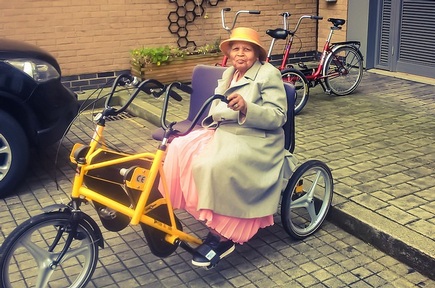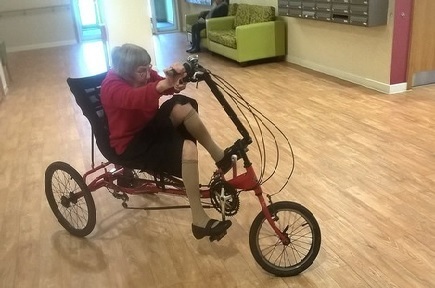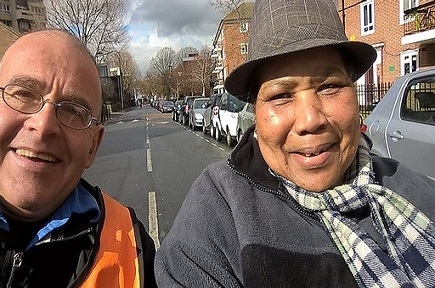Positive Spin: Enabling people with dementia to feel 'free and happy' by cycling
Positive Spin has a range of all-ability trikes as well as regular bikes, with the aim of Cycle Training UK's project to offer a fun and sociable activity that has the potential to enhance health and well-being in people living with dementia.

Following a successful pilot last year, the innovative London-based project is now being rolled out in both Lambeth and Hackney and supports individuals living at home as well as those living in care homes and sheltered housing.
“The project aims to break down any barriers that exist to getting out on a bike,” said David Dansky of Cycle Training UK, who helps deliver the project.
A range of benefits have been noted since the project started in July 2015, including: increasing people’s muscle strength, reducing stress and depression and increasing confidence.
Challenging the fears of cycling
Elaine, a participant of Positive Spin, said: “What a brilliant sense of freedom it was to ride around in the sunshine. I never dreamed that I would be riding around once more at nearly 70-years-old. I feel on top of the world.”
Participant Marion added: “My husband Ian and I thoroughly enjoy Positive Spin at Finsbury park. Ian has early onset dementia and over the last six months his Alzheimer's has progressed. He now needs my help with most things, including personal care. However, cycling is one of the only activities that Ian does not need my help for. We have both benefitted immensely from the exercise and Ian’s confidence and overall happiness has significantly increased.”
Simona Florio, Healthy Living Club coordinator at Lingham Court’s extra care housing, has also commented on the success of the project.
“When Richard and Violet started Positive Spin they were a bit nervous, but their sense of anticipation and excitement was palpable. The fact they were able to participate in an initiative that aroused their sense of adventure felt like a good thing in itself.
“Coming back, with their faces glowing and so keen to tell the rest of us what they had been up to was even more delightful to see. Exercise is the way forward for people living with dementia and it’s wonderful to see people like Richard and Violet so free and happy.”
A sense of freedom

Positive Spin occurs over several weeks and caters for around ten people at any one time. The sessions often take place in parks, where volunteers support older people with dementia (and their carers) to experience cycling using a variety of cycles, including tandems, rickshaw bikes or side-by-side bikes.
According to Mr Dansky “many participants have learned to cycle from scratch whilst others have progressed from trikes to cycles and have re-learnt skills they thought had been lost.
“You don't need to have had any previous experience, or even be able to ride a bike to take part. Participant engagement can range from Bikeability training and social rides, to simply observing, socialising and talking to others.”
He added: “Cycling is possible for people with a diagnosis of dementia of any age - which often surprises potential referrals who may opt out due to a belief that residents would be unable to take part.
Family-friendly activity
For those who have received a diagnosis of dementia, a sense of freedom to move around independently and under their own control can be achieved by participating in projects such as Positive Spin.
According to the NHS, regular, low-impact exercise such as cycling has been proven to improve a person's balance and coordination. Yet research suggests cycling represents only one per cent of all journeys made for people aged 65 and over in the UK, compared with 23 per cent in the Netherlands and 15 per cent in Denmark.
A recent study published in the Journal of Physiology, found that amateur cyclists aged 55 to 79 were physically much younger than most people their age who did not participate in cycling.
The 81 male and 41 female participants underwent extensive tests on their hearts, lungs, reflexes, muscle and bone strength and mental ability.
Researchers found that despite an age range of 25 years, older members of the group had similar muscle strength, lung power and exercise capacity to the younger participants.
’Staying physically active can buy you extra years of function’

Lead researcher Professor Norman Lazarus, a member of the King’s College London team, said: “Inevitably, our bodies will experience some decline with age, but staying physically active can buy you extra years of function compared to sedentary people.
“Cycling not only keeps you mentally alert, but requires the vigorous use of many of the body’s key systems such as your muscles and heart and lungs which you need for maintaining health and for reducing the risks associated with numerous diseases.”
Clare Morris, Cycle Training UK's dementia specialist, believes the benefits of cycling for people with dementia have been greater than expected.
“Cycling is a learnt and practised activity using procedural memory often unimpaired in people with dementia,” she said. “Riding with other family members leads to an activity all can take part in on equal footing, and with the support of a team of skilled instructors, people and their families can forget their troubles for the duration of the session and beyond it.”
Since its launch, Positive Spin has helped over 150 people living with dementia and was recently shortlisted in the National Transport Awards 2016.
For more information visit: www.cycletraining.co.uk
Latest Features News
 28-Nov-19
2019 Election: Labour pledges £10.8 bn for free personal care while Boris Johnson sidelines social care
28-Nov-19
2019 Election: Labour pledges £10.8 bn for free personal care while Boris Johnson sidelines social care
 18-Oct-19
Podcast: Wendy Mitchell and dementia: 'My biggest fear is not knowing who my daughters are'
18-Oct-19
Podcast: Wendy Mitchell and dementia: 'My biggest fear is not knowing who my daughters are'
 30-Sep-19
World's oldest diver aged 96 says 'never accept the fact you are getting old'
30-Sep-19
World's oldest diver aged 96 says 'never accept the fact you are getting old'
 27-Sep-19
Exclusive: Care minister backs care workers' call for time off to grieve and attend funerals
27-Sep-19
Exclusive: Care minister backs care workers' call for time off to grieve and attend funerals
 20-Sep-19
Podcast: Gyles Brandreth urges care workers to learn poetry with elderly
20-Sep-19
Podcast: Gyles Brandreth urges care workers to learn poetry with elderly